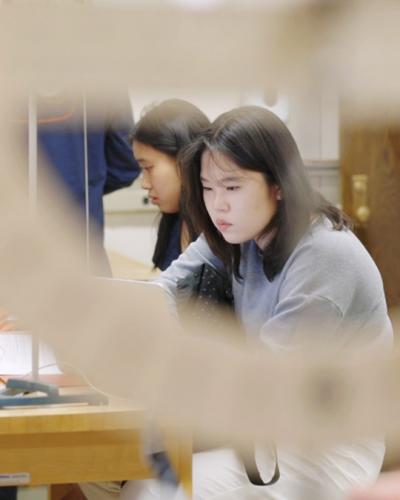Physics Education Research (PER) is the study of how people learn physics and how to improve the quality of physics education. Researchers use the tools and methods of science to answer questions about physics learning that require knowledge of physics. Researchers focus on developing objective means of measuring the outcomes of educational interventions. How do we know whether our courses and interventions are successful?
One such approach is the design of diagnostic assessments and surveys. While many instructors develop questions to assess student learning, diagnostic research assessments undergo rigorous design, testing, and validation processes to facilitate objective comparisons between students and methods of instruction. These assessments are like detectors that must be carefully crafted and calibrated to ensure we understand what they are measuring.
The Cornell Physics Education Research Lab has a large focus on studying and developing learning in lab courses. Researchers are collecting data to evaluate the efficacy of lab courses in achieving various goals, from reinforcing physics concepts to fostering student attitudes and motivation to developing critical thinking and experimentation skills. They are designing innovative teaching methods to harness the affordances of lab courses, namely, working with messy data, getting hands on materials, troubleshooting equipment, and connecting physical models to the real world and data. There are many open research questions related to understanding how students learn these ideas.
This work will be facilitated by a research Active Learning Initiative grant from the Cornell University College of Arts and Sciences led by Natasha Holmes (PI). This grant will facilitate the renewal of the physics lab elements of the two calculus-based introductory physics course sequences. In addition to redesigning the instructional materials, this project will involve significant attention on understanding how instructional materials get passed down between instructors and sustained over time, how teaching assistants are trained to support the innovative designs, and many open research questions to evaluate students’ experience and learning in these courses.
The recent Cornell University Physics Initiative in Deliberate practice (CUPID) was a 5-year project to renew the introductory, calculus-based physics course sequence for Engineering and Physics majors. This project, led by Jeevak Parpia and Tomás Arias and involving more than 8 other faculty and lecturers in the department, applied results of PER to improve the teaching and learning in Cornell University courses, and to test the generalizability of results observed elsewhere. By collecting assessment, survey, and exam data across the duration of the course implementation, the group demonstrated significant improvements in student learning and attitudes. They are now in the process of monitoring how the course materials get passed on to new faculty. There are many opportunities to study differences in various forms of active learning.
Related people

Ann S. Bowers Associate Professor

